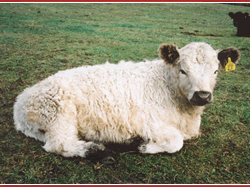Dennis Starkey
Hillview Farm
R.R. #4, Durham, Ontario N0G 1R0
Tel: (519) 369-6966
grassrootsmeats@gmail.com


 Why Grassfed is Better Than Organicby Jo RobinsonOrganic meat is now available at many supermarkets, which is a change for the better. When you see the organic label you know the food is going to be free of pesticide residues, synthetic hormones, genetically modified organisms, and a long list of questionable additives.
You also have the satisfaction of knowing that the farms that produced it are less harmful to the environment.
But organic is not enough. Few consumers realize that many of the large organic producers raise their animals in confinement and feed them grain, just like ordinary commercial producers. Feeding large amounts of grain to a grazing animal decreases the nutritional value of its products whether the grain is ordinary grain or organic. For example, in a recent test, milk from an organic dairy had no more omega-3 fatty acids or cancer fighting CLA than the milk from a non-organic confinement dairy. For maximum nutritional benefits, the animals "gotta graze, 'til the end." Similarly, meat from a cow raised in an organic feedlot has the same increased risk of E coli infection as meat from an ordinary feedlot. All types of grain make the digestive tract of a ruminant abnormally acid. This acidic environment causes E coli to multiply and become more acid-resistant. According to a recent study published in the Journal Of Science, these altered bacteria are much more likely to survive the cleansing acidity of our digestive juices. Taking animals out of their natural environment and feeding them an unnatural diet has jeopardized human health far more than anyone imagined. The best of all worlds, in my opinion, is to buy products from organically certified, pasture-based farms. Then you have the nutritional advantages of grassfed products plus the assurances that organic certification imply. Many grassfarmers do not have full organic certification even though they do not use drugs or hormones. Some use small amounts of nitrogen fertilizer on their pastures. Others will treat animals to rid them of parasites. And some grassfarmers meet all the criteria but want to spare the time and expense of annual organic certification. Clearly, it takes an enlightened consumer to weigh all those pros and cons. But it is important not to blindly trust the organic label. Animals need more than an organic diet -they need their original diet! Now we know that when animals are fed the diet they are designed to eat, their products are ideally suited for our needs as well. We are part of a cycle that is far grander and more exacting than anyone realized. Jo Robinson is a New York Times bestselling writer. Visit her website www.eatwild.com to find new research about grassfarming. Purchase her book, Why Grassfed Is Best. Vachon Press |
Other articles
Grassfed basics |
 Home
Home
